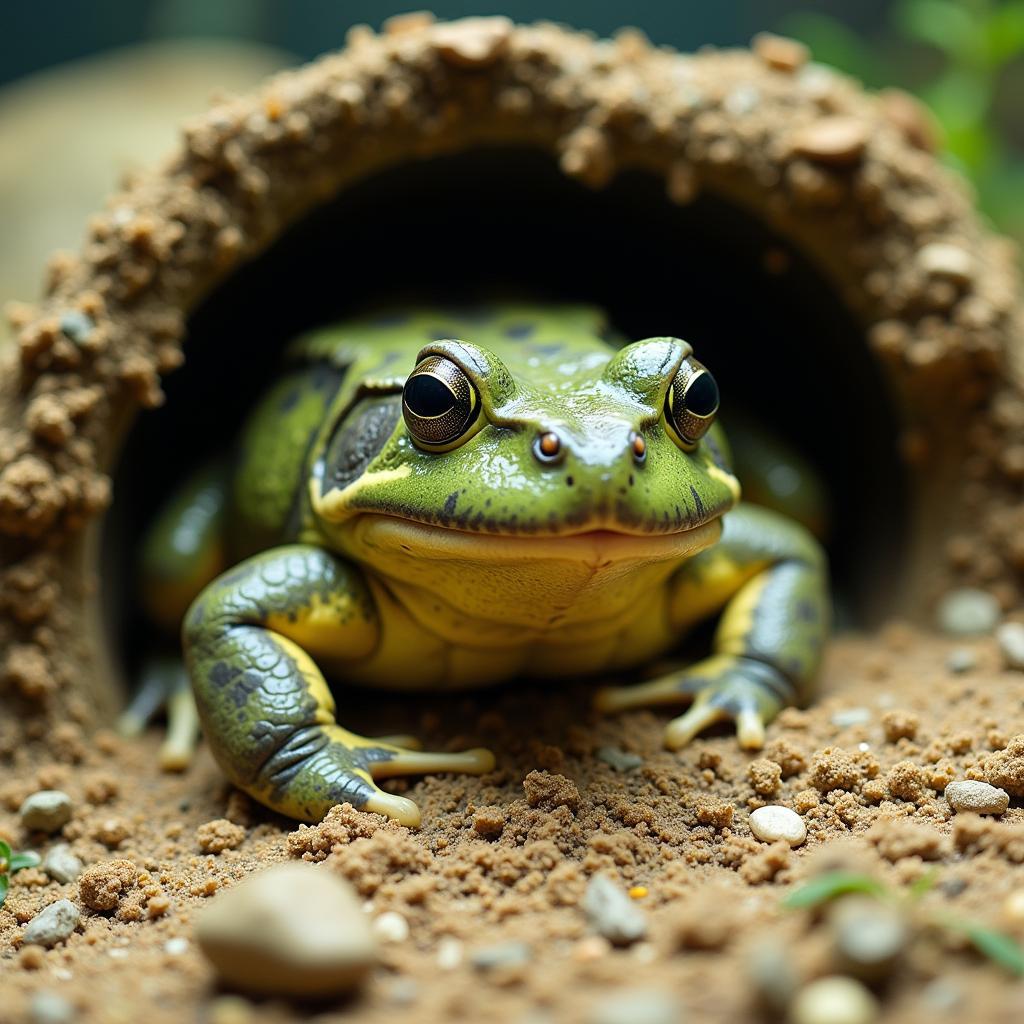The Enthralling World of the African Bullfrog Pet
The African bullfrog, with its distinctive croak and impressive size, is becoming an increasingly popular exotic pet. This article delves into the fascinating world of keeping an African bullfrog as a pet, covering everything from their unique adaptations to their specific dietary needs.
Understanding the African Bullfrog: Habitat and Adaptations
Native to sub-Saharan Africa, these amphibians thrive in a range of environments, from savannas to grasslands. Their ability to survive in harsh conditions stems from remarkable adaptations. One notable adaptation is their ability to estivate, a form of dormancy similar to hibernation, during dry periods. This allows them to conserve energy and survive until the rains return. Another impressive adaptation is their powerful bite, used for catching prey ranging from insects to small rodents. For more details about their adaptations, see african bullfrog adaptations.
What are the natural behaviors of an African Bullfrog? African bullfrogs are primarily nocturnal hunters, spending the day burrowed underground to escape the heat. Their diet in the wild consists of insects, rodents, and even other frogs. Understanding these natural behaviors is crucial for providing appropriate care in captivity.
Setting up the Perfect Home for your African Bullfrog Pet
Creating a suitable habitat is essential for the well-being of your African Bullfrog Pet. A spacious terrarium is a must, providing ample room for burrowing and exploration. The substrate should be a mix of soil and coconut fiber, allowing for proper humidity retention. Maintaining the correct temperature and humidity levels is crucial for mimicking their natural environment.
How big should an African bullfrog terrarium be? A 10-gallon tank is sufficient for juveniles, while adults require a larger enclosure, at least 20 gallons. A secure lid is essential to prevent escape, as these frogs are surprisingly strong jumpers.
Feeding your African Bullfrog: A Carnivorous Diet
As voracious predators, African bullfrogs require a diet rich in protein. Suitable food items include insects like crickets, mealworms, and roaches. Occasionally, they can be offered pinky mice, but this should not be a staple food. Learn more about their diverse diet by checking out african bullfrog eating everything.
What do baby African bullfrogs eat? Juvenile African bullfrogs should be fed smaller insects, such as pinhead crickets and fruit flies, several times a day.
Handling and Health Considerations
While these frogs can tolerate some handling, it’s important to be gentle and avoid stressing them. Always wash your hands thoroughly before and after handling to prevent the spread of bacteria. Regular veterinary check-ups are recommended to ensure their continued health. For information about their eating habits, check out african bullfrog eating mouse.
How often should I handle my African bullfrog? Handling should be minimized to avoid causing undue stress. Short handling sessions, a few times a week, are sufficient for interaction.
African Bullfrog Hibernation: Understanding the Cycle
Understanding their natural estivation cycle is crucial for the long-term health of your African bullfrog pet. During this period, they will burrow underground and remain dormant for several months. You can learn more about this process at african bullfrog hibernation.
Why does my African bullfrog bury itself? Burrowing is a natural behavior for African bullfrogs, both for thermoregulation and for estivation during dry periods. Providing a deep substrate layer in their terrarium is essential to accommodate this behavior.
 An African bullfrog begins to burrow into the substrate of its terrarium.
An African bullfrog begins to burrow into the substrate of its terrarium.
Conclusion: A Rewarding but Demanding Pet
The African bullfrog pet offers a unique and captivating experience for exotic animal enthusiasts. However, their specific care requirements necessitate thorough research and commitment. By understanding their needs and providing the proper environment, you can enjoy the fascinating company of this remarkable amphibian. Remember to always prioritize the well-being of your African bullfrog and ensure its needs are met.
FAQs
- What is the lifespan of an African bullfrog? African bullfrogs can live up to 25 years in captivity with proper care.
- Are African bullfrogs poisonous? No, African bullfrogs are not poisonous.
- How much does an African bullfrog cost? The price can vary depending on the seller and the frog’s age, typically ranging from $20 to $50.
- Can African bullfrogs live together? While juveniles can cohabitate, adult males can be territorial and should be housed separately.
- How often should I clean my African bullfrog’s tank? Spot cleaning should be done daily, with a full tank cleaning every 2-4 weeks.
- What are the signs of a sick African bullfrog? Lethargy, loss of appetite, and skin discoloration can indicate illness.
- Do African bullfrogs need UVB light? UVB lighting is not essential but can be beneficial for their overall health. See our article on african bullfrog eating mouse.
When you need assistance, please contact Phone Number: +255768904061, Email: [email protected] Or visit: Mbarali DC Mawindi, Kangaga, Tanzania. We have a 24/7 customer service team.
